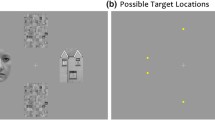Abstract
The cognitive view of human classical conditioning is that Ss are active in thinking about the pattern of stimulus events which occurs, the demands of the situation, and the kind of responses which they give. A question crucially central to conditioning theory is whether these thoughts and expectations determine conditional responding. This paper reports on two conditioning and personality experiments, employing the standard procedure of a single cue CS-UCS schedule and masking task, which assess awareness of stimulus contingencies and demand characteristics by means of a postexperimental questionnaire. Results were quite clear in showing no significant relationship between measures of awareness and eyelid conditioning.
Similar content being viewed by others
References
Adam, G.Interception and Behaviour: an Experimental Approach. Budapest: Akadémia Kiado, 1967.
Beyts, J., Frcka, G., Martin, I., and Levey, A. B. The influence of psychoticism and extraversion on classical eyelid conditioning, using a paraorbital shock UCS.Personality and Individual Differences (In press, 1983).
Brewer, W. F. There is no convincing evidence for operant or classical conditioning in adult humans. In W. Weimer, and D. Palermo (Eds.),Cognition and the Symbolic Processes. Hillsdale, N. J.: Lawrence Erlbaum, 1974.
Dawson, M. E. Can classical conditioning occur without contingency learning? A review and evaluation of the evidence.Psychophysiology, 1973,10, 82–86.
Dawson, M. E., and Bifemo, M. A. Concurrent measurement of awareness and electrodermal classical conditioning.Journal of Experimental Psychology, 1973,101, 55–62.
Dawson, M. E., and Furedy, J. F. The role of awareness in human differential autonomic classical conditioning: the necessary gate hypothesis.Psychophysiology, 1976,13, 50–53.
Dawson, M. E., and Reardon, P. Construct validity of recall and recognition post-conditioning measures of awareness.Journal of Experimental Psychology, 1973,95, 308–315.
Dulany, D. E. On the support of cognitive theory in opposition to behaviour theory: a methodological problem. In W. Weimer, and D. Palermo (Eds.),Cognition and the Symbolic Processes. Hillsdale, N. J.: Lawrence Erlbaum, 1974.
Eysenck, H. J. The conditioning model of neurosis.Behavioural and Brain Sciences, 1979,2, 155–199.
Eysenck, H. J. General features of the model. Ch. 1. In H. J. Eysenck (Ed.),A Model for Personality. Berlin: Springer Verlag, 1981, pp. 1–37.
Eysenck, H. J., and Eysenck, S. B. G.Psychoticism as a Dimension of Personality. London: Hodder & Stoughton, 1976.
Eysenck, S. B. G., and Eysenck, H. J. The place of impulsiveness in a dimensional system of personality description.British Journal of Social and Clinical Psychology, 1977,16, 57–68.
Eysenck, S. B. G., and Eysenck, H. J. Impulsiveness and venturesomeness: their position in a dimensional system of personality description.Psychological Reports, 1978,43, 1247–1255.
Frcka, G., Beyts, J., Levey, A. B., and Martin, I. The influence of psychoticism on classical conditioning.Personality and Individual Differences, 1983,4, 189–197.
Furedy, J. J., Arabian, J. M., Thiels, E., and George, L. Direct and continuous measurement of relational learning in human Pavlovian conditioning.Pavlovian Journal of Biological Science, 1982,17, 69–79.
Grant, D. A. Cognitive factors in eyelid conditioning.Psychophysiology, 1973,10, 75–81.
Grings, W. W. Verbal-perceptual factors in the conditioning of autonomic responses. In Prokasy, W. F. (Ed.),Classical Conditioning: A Symposium. New York: Appleton-Century-Crofts, 1965, pp. 71–89.
Hartmann, T. F., and Ross, L. E. An alternative criterion for the elimination of ‘voluntary’ responses in eyelid conditioning.Journal of Experimental Psychology, 1961,61, 334–338.
Hillner, K. P.Conditioning in Contemporary Perspective. New York: Springer Publishing, 1979.
Insko, C. A., and Oakes, W. F. Awareness and the ‘Conditioning’ of Attitudes.Journal of Personality and Social Psychology, 1966,6, 487–496.
Jones, J., Eysenck, H. J., Martin, I., and Levey, A. B. Personality and the topography of the conditioned eyelid response.Personality and Individual Differences, 1981,2, 61–83.
Krasner, L., and Ullman, L. P. Variables affecting report of awareness in verbal conditioning.Journal of Psychology, 1963,56, 193–202.
Law, L. N., Levey, A. B., and Martin, I. Response detection and measurement. Ch. 13. In I. Martin, and P. H. Venables (Eds.),Techniques in Psychophysiology. Chichester: Wiley, 1980, pp. 629–663.
Levey, A. B., and Martin, I. Personality and Conditioning. Ch. 5. In H. J. Eysenck (Ed.),A Model for Personality. Berlin: Springer-Verlag, 1981, pp. 123–168.
Levey, A. B., and Martin, I. Cognitions, Evaluations and Conditioning. Rules of Sequence and Rules of Consequence.Advances in Behaviour Research and Therapy (In press, 1983).
Martin, I., and Levey, A. B. Latency of the eyelid UCR during conditioning.Life Sciences, 1966,5, 17–26.
Martin, I., and Levey, A. B.The Genesis of the Classical Conditioned Response. Oxford: Pergamon, 1969.
Martin, I., and Levey, A. B. Evaluative conditioning.Advances in Behaviour Research & Therapy, 1978,1, 57–101.
Nisbett, R. E., and Wilson, T. D. Telling more that we can know: verbal reports of mental processes.Psychological Review, 1977,54, 231–259.
Perry, L. E., Grant, D. A., and Schwartz, M. Differential eyelid conditioning with grammaticality of a noun phrase as the discrimination. Paper presented at the Meeting of the Psychonomic Society, St. Louis, 1971.
Seligman, M. E. P., and Johnston, J. C. A cognitive theory of avoidance learning. Ch. 4. In F. J. McGuigan, and D. B. Lunsden (Eds.),Contemporary Approaches to Conditioning and Learning. London: Wiley, 1973, pp. 69–110.
Spielberger, C. The role of awareness in verbal conditioning.Journal of Personality, 1962,30 (Suppl.), 73–101.
Staats, C. K., and Staats, A. W. Meaning established by classical conditioning.Journal of Experimental Psychology, 1957,54, 74–80.
Author information
Authors and Affiliations
Additional information
The support of the Bethlem-Maudsley Research Fund is gratefully acknowledged.
Supported by an MRC studentship.
Rights and permissions
About this article
Cite this article
Frcka, G., Beyts, J., Levey, A.B. et al. The role of awareness in human conditioning. Pav. J. Biol. Sci. 18, 69–76 (1983). https://doi.org/10.1007/BF03001857
Issue Date:
DOI: https://doi.org/10.1007/BF03001857




